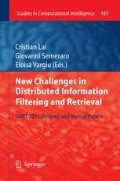Abstract
Concept representation is still an open problem in the field of ontology engineering and, more in general, of knowledge representation. In particular, it still remains unsolved the problem of representing "non classical" concepts, i.e. concepts that cannot be defined in terms of necessary and sufficient conditions. In this chapter we review empirical evidence from cognitive psychology, which suggests that concept representation is not an unitary phenomenon. In particular, it seems that human beings employ both prototype and exemplar based representations in order to represent non classical concepts. We suggest that a similar, hybrid prototype-exemplar based approach could be useful also in the field of formal ontology technology.
Access this chapter
Tax calculation will be finalised at checkout
Purchases are for personal use only
Preview
Unable to display preview. Download preview PDF.
References
Baader, F., Calvanese, D., McGuinness, D., Nardi, D., Patel-Schneider, P.: The Description Logic Handbook: Theory, Implementations and Applications, 2nd edn. Cambridge University Press (2010)
Baader, F., Hollunder, B.: Embedding defaults into terminological knowledge representation formalisms. J. Autom. Reasoning 14(1), 149–180 (1995)
Bizer, C., Heath, T., Berners-Lee, T.: Linked Data - The Story So Far. International Journal on Semantic Web and Information System 5(3), 1–22 (2009)
Bobillo, F., Straccia, U.: An OWL Ontology for Fuzzy OWL 2. In: Rauch, J., Raś, Z.W., Berka, P., Elomaa, T. (eds.) ISMIS 2009. LNCS, vol. 5722, pp. 151–160. Springer, Heidelberg (2009)
Bonatti, P.A., Lutz, C., Wolter, F.: Description logics with circumscription. In: Proc. KR 2006, pp. 400–410 (2006)
Brachman, R., Levesque, H. (eds.): Readings in Knowledge Representation. Morgan Kaufmann, Los Altos (1985)
Brachman, R., Schmolze, J.G.: An overview of the KL-ONE knowledge representation system. Cognitive Science 9, 171–216 (1985)
Donini, F.M., Nardi, D., Rosati, R.: Description logics of minimal knowl-edge and negation as failure. ACM Trans. Comput. Log. 3(2), 177–225 (2002)
Frixione, M., Lieto, A.: The Computational Representation of Concepts in Formal Ontologies: Some General Consideration. In: Proc. KEOD 2010, Valencia, Spain, pp. 396–403 (2010)
Frixione, M., Lieto, A.: Representing Concepts in Formal Ontologies: Compositionality vs. Typicality Effects, to appear in Logic and Logical Philosophy (in press)
Gagliardi, F.: A Prototype-Exemplars Hybrid Cognitive Model of “Phenomenon of Typicality” in Categorization: A Case Study in Biologi-cal Classification. In: Proc. 30th Annual Conf. of the Cognitive Science Society, Austin, TX, pp. 1176–1181 (2008)
Gagliardi, F.: Cognitive Models of Typicality in Categorization with In-stance-Based Machine Learning. In: Practices of Cognition. Recent Researches in Cognitive Science, pp. 115–130. University of Trento Press (2010)
Gärdenfors, P.: Conceptual Spaces: The Geometry of Thought. The MIT Press/Bradford Books, Cambridge, MA (2000)
Jansen, B.J., Booth, D.L., Spink, A.: Determining the informational, navigational, and transactional intent of Web queries. Information Processing and Management 44, 1251–1266 (2008)
Machery, E.: Doing without Concepts. Oxford University Press, Oxford (2009)
Malt, B.C.: An on-line investigation of prototype and exemplar strategies in classification. Journal of Experimental Psychology: Learning, Memory, and Cognition 15(4), 539–555 (1989)
Medin, D.L., Schaffer, M.M.: Context theory of classification learning. Psychological Review 85(3), 207–238 (1978)
Medin, D.L., Schwanenflugel, P.J.: Linear separability in classification learning. J. of Exp. Psyc.: Human Learning and Memory 7, 355–368 (1981)
Minsky, M.: A framework for representing knowledge. In: Winston, P. (ed.) The Psychology of Computer Vision. McGraw-Hill, New York (1975); Also in Brachman & Levesque (1985)
Murphy, G.L.: The Big Book of Concepts. The MIT Press, Cambridge (2002)
Nosofsky, R.M.: Attention, similarity, and the identification categorization relationship. Journal of Experimental Psychology: General 115, 39–57 (1986)
Osherson, D.N., Smith, E.E.: On the adequacy of prototype theory as a theory of concepts. Cognition 11, 237–262 (1981)
Quillian, M.R.: Semantic memory. In: Minsky, M. (ed.) Semantic Information Processing. The MIT Press, Cambridge (1968)
Rosch, E.: Cognitive representation of semantic categories. Journal of Experimental Psychology 104, 573–605 (1975)
Smith, J.D., Murray, M.J., Minda, J.P.: Straight talk about linear separabili-ty. Journal of Experimental Psychology: Learning, Memory, and Cognition 23, 659–668 (1997)
Smith, J.D., Minda, J.P.: Prototypes in the mist: The early epochs of cate-gory learning. Journal of Experimental Psychology: Learning, Memory, & Cognition 24, 1411–1436 (1998)
Smith, J.D., Minda, J.P.: Thirty categorization results in search of a model. Journal of Experimental Psychology: Learning, Memory, and Cognition 26, 3–27 (2000)
Stoilos, G., Stamou, G., Tzouvaras, V., Pan, J.Z., Horrocks, I.: Fuzzy OWL: Uncertainty and the Semantic Web. In: Proc. Workshop on OWL: Experience and Directions (OWLED 2005). CEUR Workshop Proceedings, vol. 188 (2005)
Wittgenstein, L.: Philosophische Untersuchungen. Blackwell, Oxford (1953)
Author information
Authors and Affiliations
Corresponding author
Editor information
Editors and Affiliations
Rights and permissions
Copyright information
© 2013 Springer-Verlag Berlin Heidelberg
About this chapter
Cite this chapter
Frixione, M., Lieto, A. (2013). Representing Non Classical Concepts in Formal Ontologies: Prototypes and Exemplars. In: Lai, C., Semeraro, G., Vargiu, E. (eds) New Challenges in Distributed Information Filtering and Retrieval. Studies in Computational Intelligence, vol 439. Springer, Berlin, Heidelberg. https://doi.org/10.1007/978-3-642-31546-6_10
Download citation
DOI: https://doi.org/10.1007/978-3-642-31546-6_10
Publisher Name: Springer, Berlin, Heidelberg
Print ISBN: 978-3-642-31545-9
Online ISBN: 978-3-642-31546-6
eBook Packages: EngineeringEngineering (R0)

